Development Economics and Policy
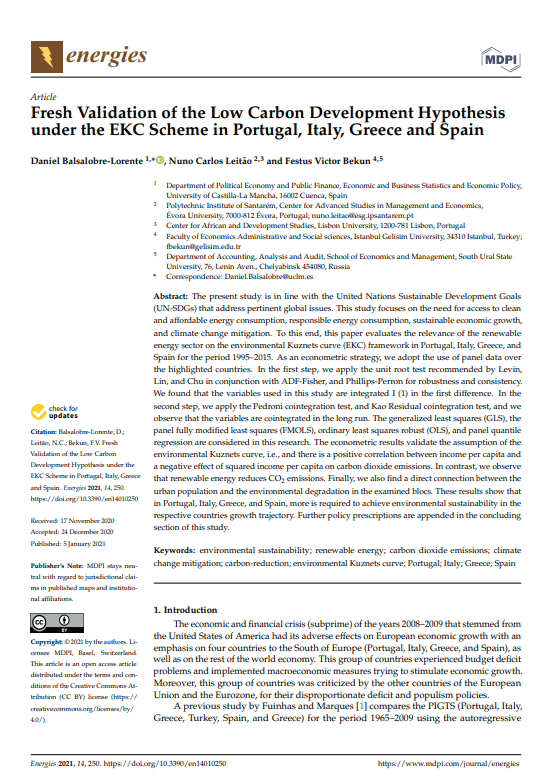
Fresh Validation of the Low Carbon Development Hypothesis under the EKC Scheme in Portugal, Italy, Greece and Spain
Abstract:
Fresh Validation of the Low Carbon Development Hypothesis under the EKC Scheme in Portugal, Italy, Greece and Spain is in line with the United Nations Sustainable Development Goals (UN-SDGs) that address pertinent global issues. This study focuses on the need for access to clean and affordable energy consumption, responsible energy consumption, sustainable economic growth, and climate change mitigation. To this end, this paper evaluates the relevance of the renewable energy sector on the environmental Kuznets curve (EKC) framework in Portugal, Italy, Greece, and Spain for the period 1995–2015. As an econometric strategy, we adopt the use of panel data over the highlighted countries. In the first step, we apply the unit root test recommended by Levin, Lin, and Chu in conjunction with ADF-Fisher, and Phillips-Perron for robustness and consistency. We found that the variables used in this study are integrated I (1) in the first difference. In the second step, we apply the Pedroni cointegration test, and Kao Residual cointegration test, and we observe that the variables are cointegrated in the long run. The generalized least squares (GLS), the panel fully modified least squares (FMOLS), ordinary least squares robust (OLS), and panel quantile regression are considered in this research. The econometric results validate the assumption of the environmental Kuznets curve, i.e., and there is a positive correlation between income per capita and a negative effect of squared income per capita on carbon dioxide emissions. In contrast, we observe that renewable energy reduces CO2 emissions. Finally, we also find a direct connection between the urban population and the environmental degradation in the examined blocs. These results show that in Portugal, Italy, Greece, and Spain, more is required to achieve environmental sustainability in the respective countries growth trajectory. Further policy prescriptions are appended in the concluding section of this study.
Quotation:
Balsalobre-Lorente, D., Leitão, N.C., Bekun, F., V. (2021). Fresh Validation of the Low Carbon Development Hypothesis under EKC Scheme in Portugal, Italy, Greece, and Spain. Energies 2021. 14(1), 250. https://doi.org/10.3390/en14010250
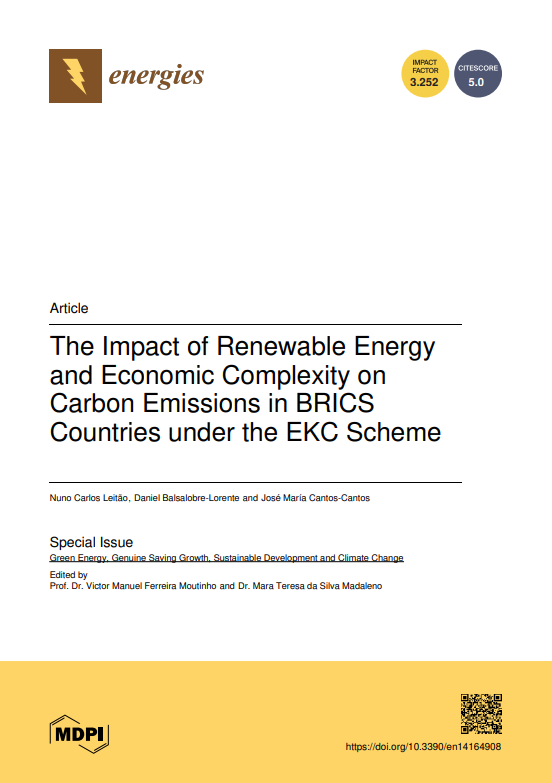
The Impact of Renewable Energy and Economic Complexity on Carbon Emissions in BRICS Countries under the EKC Scheme
Abstract:
Economic complexity makes it possible to assess the development of the countries, the relations of innovation, and the differentiation of products. The Impact of Renewable Energy and Economic Complexity on Carbon Emissions in BRICS Countries under the EKC Scheme considers the links between the hypotheses of the Kuznets environmental curve and economic complexity using panel data for the group of BRICS countries (Brazil, Russia, India, China, and South Africa) from 1990 to 2015. As an econometric strategy, this study considered the panel fully modified least squares (FMOLS), panel dynamic least squares (DOLS), fixed effects (FE), and Panel Quantile Regression. The empirical results showed that economic complexity, income per capita, renewable energy, and carbon dioxide emissions are integrated with the first difference when applying the unit root test. The arguments of Pedroni and Kao cointegration tests were also used. According to these results, the variables used in this research are cointegrated in the long run. The results validated the arguments of the EKC hypothesis, i.e., the income per capita and squared income per capita are positively and negatively correlated with CO2 emissions. Moreover, economic complexity and renewable energy aim to improve environmental damage and climate change.
Quotation:
Leitão, N.C., Balsalobre-Lorente, D., Cantos-Cantos, J.M. The Impact of Renewable Energy and Economic Complexity on Carbon Emissions in BRICS Countries under the EKC Scheme. Energies 2021, 14, 4908. https://doi.org/10.3390/en14164908
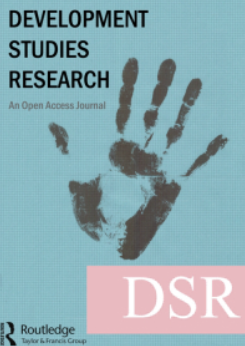
Identifying differences and similarities between donors regarding the long-term allocation of official development assistance
Abstract:
Advanced countries have pledged to mobilize additional financial resources to developing countries, including funding from multiple sources other than official development assistance (ODA), known as foreign aid. However, the effect of the novel coronavirus pandemic has raised doubts about the feasibility of such a pledge, highlighting, once again, the possible role of ODA and the importance of explaining its allocation, which could be of vital relevance for understanding its effectiveness. Identifying differences and similarities between donors regarding the long-term allocation of official development assistance analyzes a vast number of bilateral and multilateral donors by applying a novel methodology in the context of aid allocation – principal-component factor analysis – covering the period 1990–2015. The results revealed four distinct clusters of donors: (i) the proportionally largest Western European donors, characterized by a significant number of beneficiaries, especially low-income countries; (ii) donors that are predominantly driven by structural links with recipients, especially links derived from colonial connections; (iii) a group of mainly Eastern European donors who are engaged with lower-income countries in Eastern Europe and Western Asia; and (iv) a group of Asian and Oceanian donors that select their partners mainly based on the geographical proximity criterion.
Quotation:
Paulo Francisco, Sandrina B. Moreira & Jorge Caiado (2021) Identifying differences and similarities between donors regarding the long-term allocation of official development assistance, Development Studies Research, 8:1, 181-198, DOI: 10.1080/21665095.2021.1954965
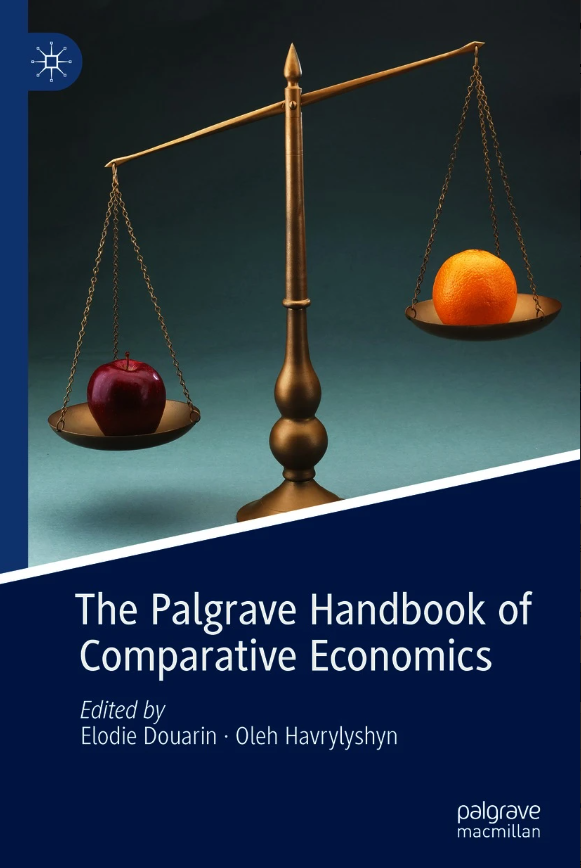
Reform Design Matters: The Role of Structural Policy Complementarities
Abstract:
In this chapter, Reform Design Matters: The Role of Structural Policy Complementarities, we discuss possible interactions across structural policy domains. While relatively more studied in the context of the post-communist transition literature, our survey suggests that relationships of this type hold more generally and can be important to improve our understanding of the relationship between structural reforms and long-run economic growth. Given its potential relevance for the design of successful reform packages, exploring in a more exhaustive way the notion that the effect of a given reform on economic growth depends on the progress made in other policy areas should be a priority point for future research. This may be particularly relevant to help unlock the growth potential of many developing and emerging countries, namely concerning their integration in the global economy. The authors would like to thank Elodie Douarin and Oleh Havrylyshyn for very useful comments on the first draft of this paper. The views expressed in this paper are those of the authors and do not necessarily reflect those of the OECD and its Member countries. Rocha acknowledges financial support from Fundação para a Ciência e Tecnologia (Portugal) through research grant UIDB/05069/2020.
Citação:
Oliveira-Martins, J., da Rocha, B.T. (2021). Reform Design Matters: The Role of Structural Policy Complementarities. In: Douarin, E., Havrylyshyn, O. (eds) The Palgrave Handbook of Comparative Economics. Palgrave Macmillan, Cham. https://doi.org/10.1007/978-3-030-50888-3_19

Acerca da Repartição Funcional do Rendimento na Economia Portuguesa
Abstract:
The functional division of income – that is, the question of its primary distribution across the different factors of production and, in particular, between labour income (wages) and capital income (profits, interest and rents) – has been a major theme in political economy since its early days. Acerca da repartição funcional do rendimento na economia Portuguesa empirically analyses the evolution of the wage share in income in Portugal between 1960 and 2017, proposing a grid for interpreting the evolution of the functional distribution in the Portuguese economy characterised by the existence of different periods. Depending on the period in question, the empirical results reveal the existence of strong and significant associations between the evolution of the functional distribution and the real GDP growth rate, the inflation rate and the unemployment rate, respectively. These results suggest the succession over time of different regimes regulating the functional distribution of income in the Portuguese economy, which shift from countercyclical to procyclical over the period under review. The article is organised as follows: after this introduction, section 2 briefly discusses the interest of functional income distribution analysis and its linkages with some other debates in economic theory and analysis; section 3 outlines the evolution of the functional distribution of income in the Portuguese economy in the decades since 1960 and its main trends over time; section 4 carries out a set of bivariate, multivariate and structural stability analyses in order to contribute to a better understanding of the determinants of such evolution; and section 5 concludes.
Quotation:
Abreu, Alexandre; July 2020; 3) “Acerca da repartição funcional do rendimento na economia portuguesa”; Notas Económicas, no. 50; 8) pp. 85-101.
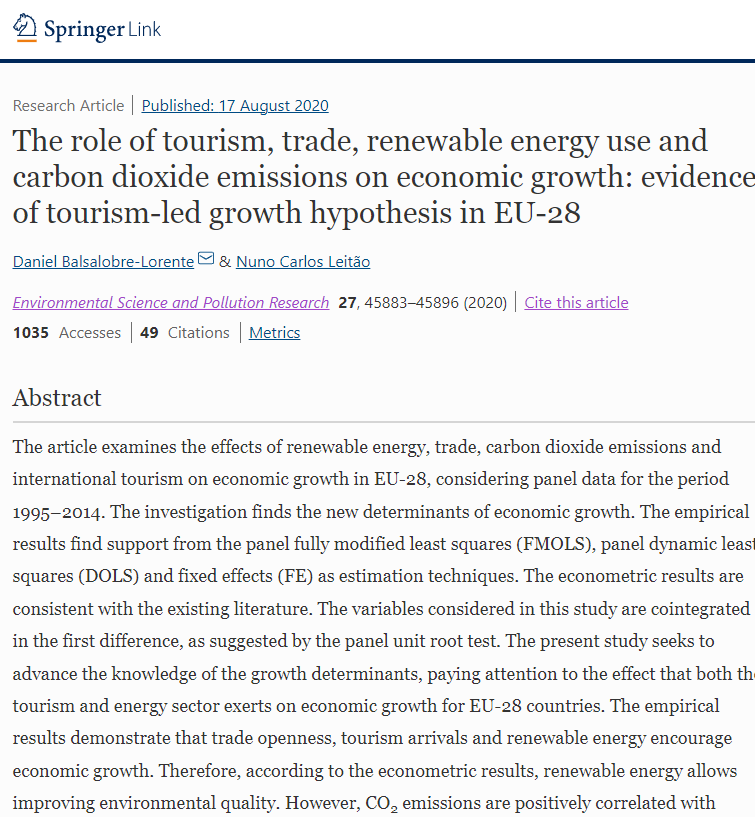
The role of tourism, trade, renewable energy use and carbon dioxide emissions on economic growth: evidence of tourism-led growth hypothesis in EU-28
Abstract:
The Role of Tourism, Trade, Renewable Energy Use and Carbon Dioxide Emissions on Economic Growth: Evidence of Tourism-Led Growth Hypothesis in EU-28 examines the effects of renewable energy, trade, carbon dioxide emissions and international tourism on economic growth in EU-28, considering panel data for the period 1995–2014. The investigation finds the new determinants of economic growth. The empirical results find support from the panel fully modified least squares (FMOLS), panel dynamic least squares (DOLS) and fixed effects (FE) as estimation techniques. The econometric results are consistent with the existing literature. The variables considered in this study are cointegrated in the first difference, as suggested by the panel unit root test. The present study seeks to advance the knowledge of the growth determinants, paying attention to the effect that both the tourism and energy sector exerts on economic growth for EU-28 countries. The empirical results demonstrate that trade openness, tourism arrivals and renewable energy encourage economic growth. Therefore, according to the econometric results, renewable energy allows improving environmental quality. However, CO2 emissions are positively correlated with economic growth, showing that growth is directly correlated by climate change and greenhouse gas. The results also confirm the tourism-led growth hypothesis (TLGH) for the panel. Finally, the empirical results confirm that trade openness, energy use and international tourism contribute to enhance economic growth. Based on these findings, further insights and policy prescription are offered in the concluding section.
Quotation:
“Balsalobre-Lorente, D., Leitão, N.C. (2020): The Role of Tourism, Trade, Renewable Energy Use and Carbon Dioxide Emissions on Economic Growth: Evidence of Tourism-Led Growth Hypothesis in EU-28. Environmental Science and Pollution Research. Publisher: Springer International Publishing”
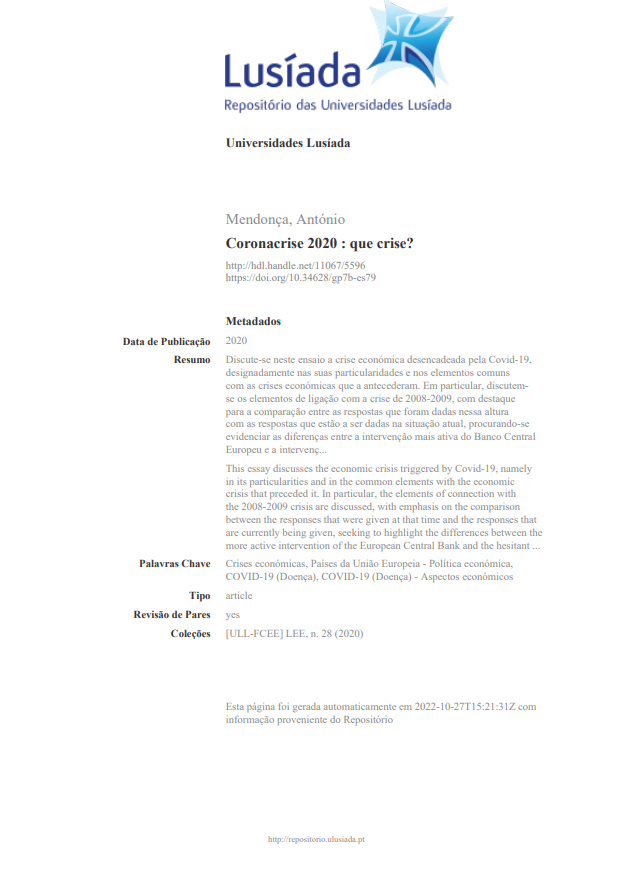
Coronacrise 2020: que crise?
Abstract:
The forecasts already published by national and international institutions on the impact of Covid-19 on economies confirm what had already been anticipated: deep falls in product and employment, fuelled by the joint reduction in consumption, investment and international trade, with consequent effects on deficits and public debt. Coronacrise 2020: que crise? discusses the economic crisis triggered by Covid-19, namely in its particularities and in the common elements with the economic crisis that preceded it. In particular, the elements of connection with the 2008-2009 crisis are discussed, with emphasis on the comparison between the responses that were given at that time and the responses that are currently being given, seeking to highlight the differences between the more active intervention of the European Central Bank and the hesitant and contradictory intervention of national and European institutions with responsibility for fiscal policy. We highlight the need for an economic recovery plan, with a European dimension and integrating national specificities, as well as the need for a change in attitude regarding the role of economic policy, that should favor a long-term expansionist perspective instead of the contractionary perspective which has conditioned European macroeconomic management in recent years.
Quotation:
Mendonça, A. (2020). “Coronacrise 2020: que crise?”. Lusíada. Economia & Empresa, nº 28 (2020), pp. 11-41. https://doi.org/10.34628/gp7b-es79
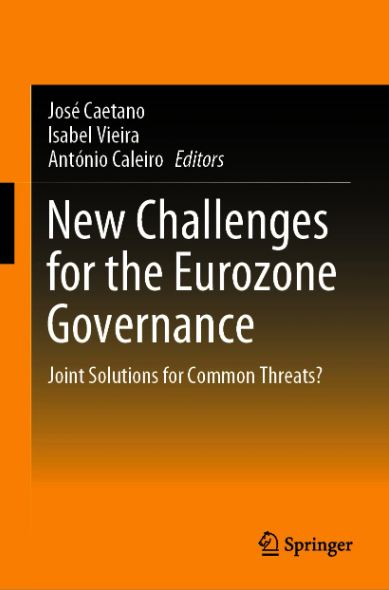
Europe at the crossroads of the COVID-19 crisis: integrated macroeconomic policy solutions for an asymmetric area
Abstract:
The economic crisis triggered by the COVID–19 pandemic once again raises doubts about the eurozone’s ability to deal with joint economic problems given its dissimilar dynamics and asymmetries. Europe at the crossroads of the COVID-19 crisis: integrated macroeconomic policy solutions for an asymmetric area contributes to a paradigm shift in the governance of the euro area towards a more comprehensive and integrated approach. Two dimensions of this paradigm are considered. First, the need for a change in the economic policy concerning the recovery, from a supply-push to a demand-pull orientation, supported on a fiscal and monetary policy mix, integrated within a comprehensive macroeconomic approach. Second, we examine the need for a shift in external relations towards a more global integration-oriented policy, with the euro area positioning itself as an alternative to the current polarization between the United States and China. Our conclusions point to: (i) giving priority to growth and employment; (ii) promoting long-term economic sustainability based on integrated macroeconomic policies, the reduction of income concentration, and the reconstitution of strong middle classes; (iii) reorientating international relations into a perspective of cooperation; (iv) reinforcing regulation and global governance; and (v) eliminating exceptional situations and ways to evade economic controls.
Quotation:
“Mendonça, A. and Vale, S. (forthcoming). “Europe at the crossroads of the COVID-19 crisis: integrated macroeconomic policy solutions for an asymmetric area”, (co-autoria com Vale, S.), in New challenges for Eurozone Governance: Are there joint solutions for common threats? (Edit. José Caetano, Isabel Vieira, and António Caleiro), London: Springer. ISBN-10:3030623718″
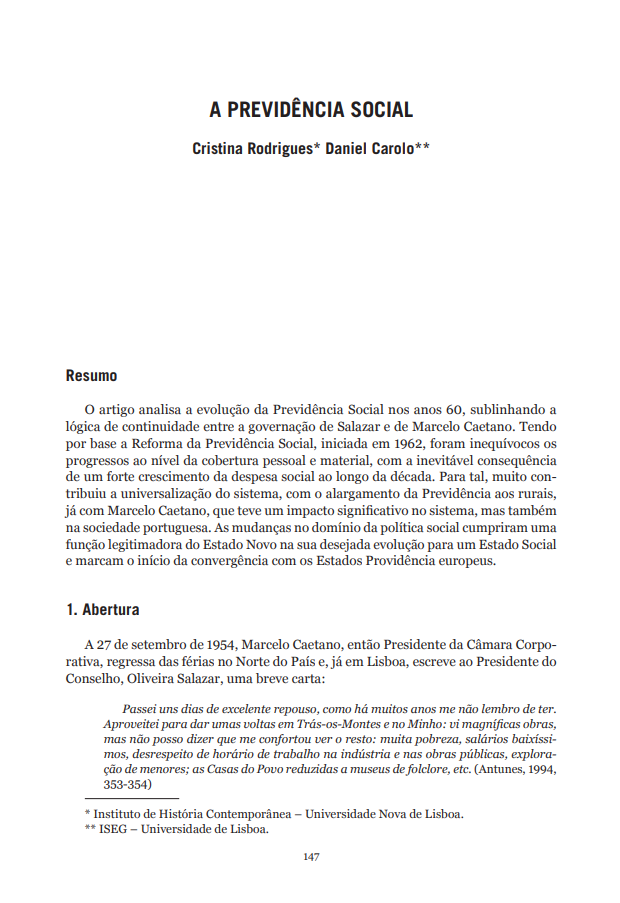
A Previdência Social
Abstract:
The 60’s corresponded to an unequivocal progress in the institutional evolution, material and personal coverage of the Social Welfare system, in which Law 2115, which instituted the 1962 Social Welfare Reform – which was in force as the Basic Law until 1984 – is absolutely central. Statistical data corroborate this statement, and even demonstrate the growth of social spending and the growing role of the State, also as a financer and not with a mere supplementary intervention. A Previdência Social analyses the evolution of Social Welfare in the 60’s, underlining the logic of continuity between Salazar’s and Marcelo Caetano’s government. Based on the Social Welfare Reform, initiated in 1962, progress in terms of personal and material coverage was unequivocal, with the inevitable consequence of a strong growth of social expenditure throughout the decade. To this end, the universalization of the system contributed a lot, with the widening of Welfare to rural areas, already under Marcelo Caetano, which had a significant impact on the system, but also on Portuguese society. The changes in the domain of social policy fulfilled a legitimizing function of the New State in its desired evolution towards a Social State and marked the beginning of convergence with the European Welfare States. We would like to thank Professors João Freire and Álvaro Garrido for reading the initial text of this article and for their relevant contributions to its final version.
Quotation:
“Rodrigues, Cristina & Carolo, Daniel (2020). “A Previdência Social”. In Brito, José Maria Brandão de Brito & Santos, Paula Borges (Coords.) Os Anos Sessenta em Portugal. Duas governações, diferentes políticas públicas. Porto: Afrontamento”
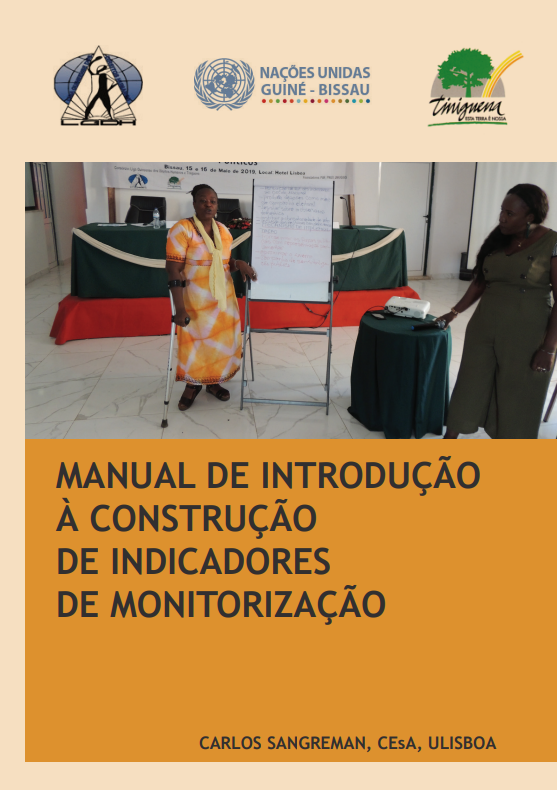
Manual de Introdução à Construção de Indicadores de Monitorização
Abstract:
Manual de Introdução a construção de indicadores de monitorização is a working and training tool for technicians from public and private, national or international institutions working in the area of development and public policies. Its objective is to enable technical experts to develop capacities to think about indicators that are appropriate for projects and policies in their area of intervention. The technical level is introductory to the subject and does not indicators on business management, for example, finance or macroeconomics, and no previous knowledge of mathematics or statistics is required beyond the basics and common sense. It contains chapters with a theoretical part and a practical part, through examples applicable to Guinea-Bissau, on simple and composite, quantitative and qualitative and composite, quantitative and qualitative indicators, short and long term sampling and descriptive statistics. Since this version is prepared for Guinea-Bissau, the last chapter seeks to reflect on the lessons from the lessons learned from the Manual on the construction of indicators which are included in the Political and Social Stability Pact (Pact), signed in 2018, as an example of a multidisciplinary area with fundamental interest for the country.
Quotation:
Sangreman, Carlos (2021). Manual de Introdução a construção de indicadores de monitorização, PNUD/UNIOGBIS, Delegação da Guiné-Bissau, 2020. Liga Guineense dos Direitos Humanos (LGDH) e Tiniguena.





